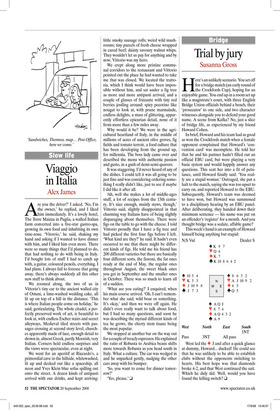Viaggio in Italia
Alex James
Are you the driver?’ I asked. ‘No, I’m the owner,’ he replied, and I liked him immediately. It’s a lovely hotel, The Torre Maizza in Puglia, a walled Italian farm converted into a five-star gastro-spa, growing its own food and inhabiting its own time-zone. ‘Vitorrio,’ he said, shaking my hand and asking if I wanted to have dinner with him, and I liked him even more. There were so many things that I’d planned to do, that had nothing to do with being in Italy. I’d bought lots of stuff I had to catch up with, a guitar, coloured pencils, everything. I had plans. I always fail to foresee that going away, there’s always suddenly all this other new stuff to think about.
We zoomed along, the two of us in Vittorio’s tiny car to the ancient walled city of Ostuni, a lime-washed wedding cake, all lit up on top of a hill in the distance. ‘This is where Italian people come on holiday,’ he said, gesticulating. The whole citadel, a perfectly preserved work of art, is beautiful to look at, with endless Escher stairs and secret alleyways, Medieval tiled streets with passages crossing at second story level, churches apparently made of lace, enough detail to drown in, almost Greek, partly Moorish, very Italian. Corners held endless surprises and the views were spectacular, even at night.
We went for an aperitif at Riccardo’s, a primordial cave in the hillside, whitewashed, lit up and decked out like a spaceship, all neon and Yves Klein blue sofas spilling out onto the street. A dozen kinds of antipasti arrived with our drinks, and kept arriving: little smoky sausage rolls; weird wild mushrooms; tiny parcels of fresh cheese wrapped in cured beef; dainty savoury walnut whips. They wouldn’t let us pay for anything and by now, Vittorio was my hero.
We crept along more pristine communal corridors to the restaurant and Vittorio pointed out the place he had wanted to take me that was closed. We located the trattoria, which I think would have been impossible without him, and sat under a fig tree as more and more antipasti arrived, and a couple of glasses of frizzante with tiny red berries jostling around: spicy pecorino like nougat to look at, with prune marmalade, endless delights, a mass of glittering, apparently effortless epicurian detail, none of it from more than a few miles away.
Why would it be? We were in the agricultural heartland of Italy, in the middle of millions of acres of ancient olive groves, fig fields and tomato terroir, a food culture that has been developing from the ground up, for millennia. The boss lady came over and described the menu with authentic passion and gusto, in a gush of demi-semi-quavers.
It was staggering. I’d never heard of any of the dishes. I could tell it was all going to be just fine and was considering ordering something I really didn’t like, just to see if maybe I did like it after all.
‘Ah, well she makes a lot of middle-ages stuff, a lot of recipes from the 13th century. It’s nice enough, mainly stews, though,’ Vittorio said, slightly disappointed in that charming way Italians have of being slightly disparaging about themselves. There were figs on the table to go with the cheese. I told Vittorio proudly that I have a fig tree and had picked the first four figs before I left. ‘What kind are they?’ he said. It hadn’t even occurred to me that there might be different kinds of figs. He told me his friend has 200 different varieties but there are basically four different sorts, the fioroni, the fat ones ready at the end of May, the regular ones throughout August, the sweet black ones you get in September and the smaller ones in October. There was so much to learn all of a sudden.
‘What are you eating?’ I enquired, when his main course arrived. ‘Oh, I can’t remember what she said, wild boar or something. It’s okay,’ and then we were off again. He didn’t even really want to talk about food, but I had so many questions, and soon he was describing the myriad different kinds of tea he grows, the cherry stem tisane being the most popular.
We stopped at another bar on the way out for a couple of treacly espressos. He explained the ratio of Robusta to Arabica beans shifts more towards Robusta as you head south in Italy. What a culture. The car was wedged in and he unparked gently, nudging the other cars away with his bumper.
‘So, you want to come for dinner tomorrow?’ ‘Yes, please.’ ❑










































































 Previous page
Previous page